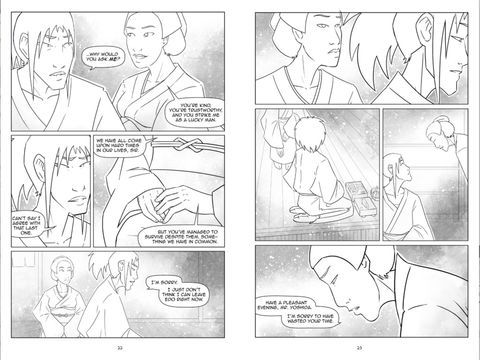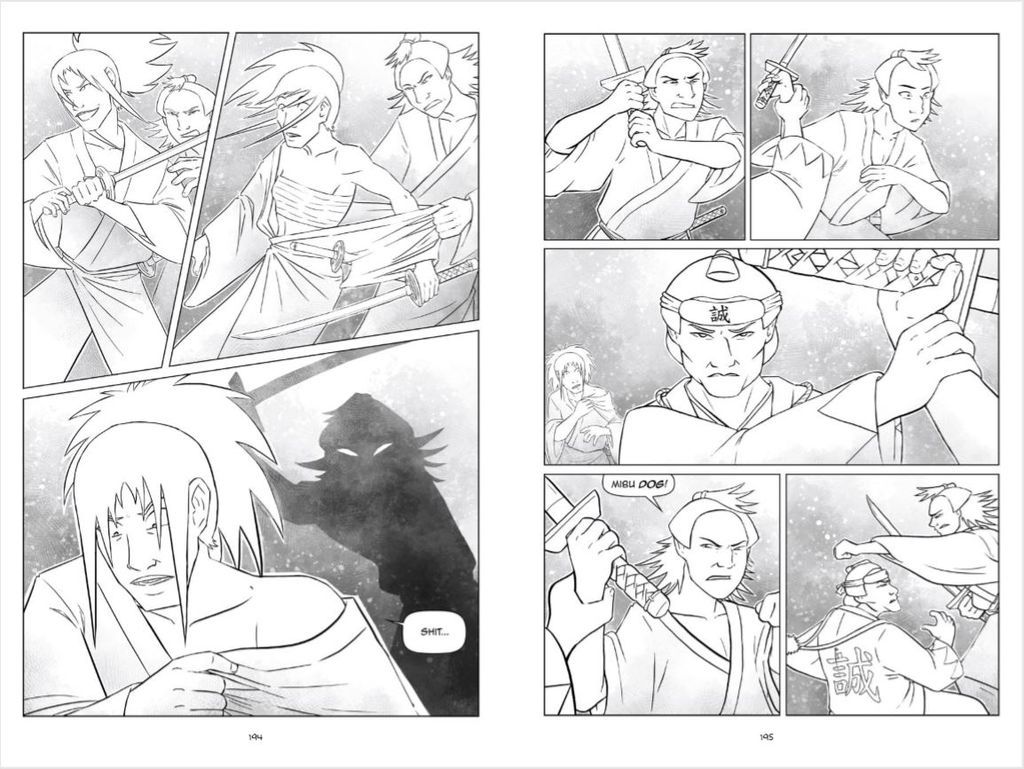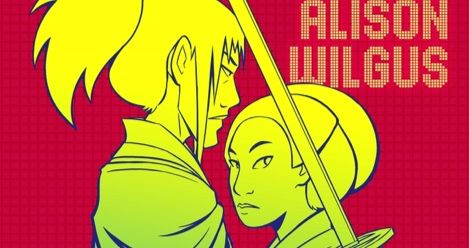
Need a Bisexual, Time Traveling Samurai? Alison Wilgus has a CHRONIN for That
As you are all no doubt aware at this point, it is my quest in life not to avoid comics by the Big Two but to curate a personal catalog in which I don’t depend on them for the majority of my books-with-pictures needs. There are only so many multiverses a girl can follow. And while I enjoy my monthly dose of capes, tights, and cowls, there is so much more out there. So many more stories to tell, so many different stories to tell about so many different things and people. So many different people telling them. One of those books is Chronin Vol. 1: The Knife at Your Back by Alison Wilgus (Tor, 2019).
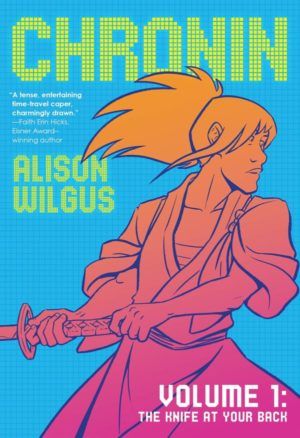
Y’all, it is magical.
I had a chance to talk to Alison about Chronin, some of her other projects, and what she’s reading at Emerald City Comic Con.
S.W. Sondheimer: You write both graphic novels and prose. Does your story dictate the form you choose or do you decide “I’m going to write a graphic novel” and then choose the story to suit the form?
Alison Wilgus: It depends on the context because sometimes I’m doing something for a reason. For instance, “I really feel like I need to be doing more short fiction so I’m going to write a short story,” and sometimes that will go great and sometimes I’ll write it and it won’t sell but I still really like the story. I’ll think, I just did this in the wrong format and I’ll take the guts of it and adapt it into something else. Or you get a little bit into it and then stop and think, “is this thing being served well by this medium? Is the art bringing something to this?” Or in prose, “Am I spending a lot of time describing something that would be visually arresting?” A graphic novel pitch I’m sending out was built around these big set piece moments and I realized, me trying to explain it to you (in words) was like me trying to explain a joke to you, it just wasn’t working.
SWS: Is it an advantage or a disadvantage that you can (and do) draw as well?
AW: When you’re drawing your own books, you can do weird things—especially someone like me who is relatively new in my career. I can draw fun ideas I have, I don’t have to convince someone else to do it. It also means that when I’m writing books for other people to draw, I can make better decisions about how to do it, especially things like page layouts. And I know what things are going to be hard, I know what things are going to be time intensive, and I’m not going to throw those things in there just for the sake of it being fun. When I draw, I always have moments of, “Well, that didn’t work,” or, “I sure did put too much text in that panel.” It makes me more flexible (when working with other artists).
SWS: Tell me where the interest in feudal Japan comes from.
AW: I’m gonna be square with you: I got really into Rurouni Kenshin when I was in college. I watched the anime because my friends were watching it, and then my friends told me there was a filler season manga and I ended up reading it. I got it into my head to write this tragic, super elaborate fanfic about it. I did all of this research and didn’t end writing the fanfic but was like, “Oh, this is actually a really interesting period of history.” I ended up going backwards in time through the civil war in addition to researching the Meiji Era. It’s so rare, especially in modern history, to have these moments where an entire country changes radically in a couple of decades from the ground up.
SWS: What are some of your favorite nonfiction sources?
AW: There was a weird academic title called Motives in the Meiji Restoration that I read a few times. It’s not the best written book in the world, but I appreciated how it was very interested in the perspectives of normal people. We tend to focus more on these big personalities and feudal lords and samurai because it’s fun and pop culture, but there were also many, many, many normal people who also had opinions about the government and the structure of society, who were in the feudal system and were also participating in this and were going on pilgrimages and farming and having class mobility. I also read a lot of really big survey histories. I have a whole bookshelf.
SWS: It was interesting for me that Mirai feels displaced in both the modern and historical settings while Kuji feels that he has the right to correct history without regards to how it might affect the future. Talk to us a little bit about that dynamic.
AW: They both have this idea of the past and how it’s impacted them as people. You have to care very much about the past to be in this ridiculously prestigious time travel program. People kept asking me, “Who’s giving these college students access to time travel.” Kuji thinks of Mirai as romanticizing it—”You just like this pop culture, inaccurate version of it and that’s disrespectful,”—but she’s like, “Okay, but I know it’s just a manga. This is my outlet. This is my fun thing,” and she’s very aware there’s this remove between the actuality and this fun comic she’s reading, whereas I feel like Kuji is much less self-aware of how much he’s framing things in this very specific kind of way.
SWS: He’s like the “well-actually” dude.
AW: He’s also the “authenticity” guy. You can think because you’re closer to something you’re an authority. On one hand, yes, he was born in Japan, but I think in a way that makes him less self-aware about the ways in which he’s bringing modern perspective and assumptions and priorities to his relationship with history. He is also centering himself in it in a way Mirai is not. She solidly thinks of herself as being an outsider, whereas Kuji…is like the Into the Wild guy: “I’m going to go in the woods and eat bears.”
SWS: And the trope in every sci-fi story that deals with time-travel…is you don’t mess with the timeline, and here he comes in and says, “I know better than the rest of you.”
AW: Everyone is the hero of their own story. He is so far up the ass of wanting to be a revolutionary and fight the civil war that he’s lost track of the fact he isn’t from there. He isn’t intentionally changing history, he’s just like, “Oh, this is bad, it would be better if we could do this other thing.” He’s disconnecting a little bit. He’s entitled, but he thinks he’s doing the right thing. In earlier versions of the story, he was the villain. In the finished version, he did some shit. He was a terrible boyfriend, but he’s an okay guy. There’s some stuff that happens to him in Vol. 2 where some friends were like, “How dare you make me care about Kuji!” I love when friends are mad at me for making them care about stuff.
SWS: I didn’t realize that there was a social caste in Japan that’s similar to the untouchable caste in India. Let’s talk about the irony of Kuji ditching Mirai for what he thinks is a proper Japanese woman who turns out to be of this untouchable caste?
AW: It’s great because he would say he wouldn’t care, but Hatsu—there’s a reason she hasn’t told him. His parents would be horrified.
SWS: You’ve also done some science comics for kids (Flying Machines, Macmillan, 2017). Is your process different when you’re writing for adults vs kids or spec fiction vs nonfiction?
AW: The difference between adults and kids isn’t as big in comics as it is in books, because the context means you don’t have to be quite as aggressive about reading levels. The bigger difference for me is between nonfiction and fiction; I find nonfiction very difficult to write. I find fiction to be a medium of momentum: getting the engine of your story going and the engine will carry you. For nonfiction, that process, for me, never stops. Every single page of Flying Machines and The Mars Challenge, I love these books. They were never easy. There’s never that feeling of, “Today is going to be a five thousand word day,” because you can’t follow your instincts in the same way. It’s like a crossword puzzle in a way. The facts are what they are.
SWS: Chronin Vol. 2 comes out in mid-September. Do you have anything specific planned after that?
AW: I have a book that I’m pitching right now that would be a YA science fiction book that I hope can find a home. I’m working on it with my friend, Pola Kowalewska—a genius. It’s a very straight forward day in the life teen story only with catastrophic space weather. I’m trying not to be the biggest cliché in the world, but I’m really trying to make time to work on my novel because I’ve been putting off working on it. Other things keep being bigger priorities. I’m going to try to do some short comics again to get back into the habit of doing that again.
SWS: Do you have any time to read?
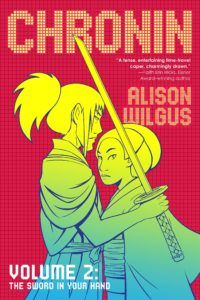
Chronin Vol. 1: The Knife at Your Back is available now and Chronin Vol. 2: The Sword in Your Hand drops Sept. 10, 2019.
Editor’s Note: This interview was edited down for clarity and length.



